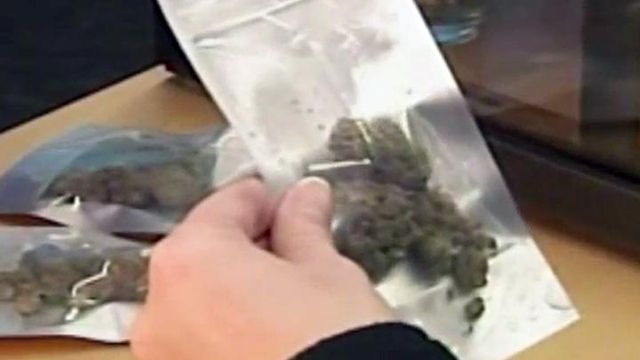Veterans, others plead with NC lawmakers to legalize medical marijuana
Veterans and friends of people who died of cancer testified to the Senate Judiciary committee about the benefits of medical marijuana to relieve the effects of post-traumatic stress disorder and the pain associated with cancer treatment.
Posted — UpdatedYour browser doesn't support HTML5 video.
"I personally looked down the barrel of my own service weapon," said Josh Biddix, a Marine and retired police officer.
"I was absolutely convinced killing myself ... was the right move," said Gary Hess, a Marine and founder and executive director of Louisiana-based Veterans Alliance for Holistic Alternatives.
"I have more deceased contacts in my phone due to suicide than I have lost men in combat over the last 20 years," said Chase Roth, a Marine and Wilmington businessman.
The veterans and friends of people who died of cancer testified to the Senate Judiciary committee about the benefits of medical marijuana to relieve the effects of post-traumatic stress disorder and the pain associated with cancer treatment.
The committee held what's believed to be the first legislative hearing ever in North Carolina on a bill to allow medical marijuana to be prescribed and used in the state. Medical marijuana bills have been filed in every legislative session for years, but legislative leaders usually shelve them.
Your browser doesn't support HTML5 video.
The measure would allow only 10 "seed-to-sale" providers of medical marijuana, each of which could operate up to four dispensaries across the state. Providers would have to go through a rigorous application process with the state Department of Health and Human Services and a new regulatory commission.
Patients seeking prescriptions would have to meet with physicians, who would have to document the condition under which a marijuana prescription was issued. Physicians also would have to undergo annual training on medical cannabis.
Dr. Julie Manly, a Duke University-trained physician who's now studying medical marijuana, said she believes legalizing it in North Carolina would reduce the amount of opioid addiction and overdoses in the state.
"Medical cannabis users are not criminals. They're your mothers and fathers, grandparents, co-workers and neighbors," Manly said. "They're your fellow North Carolinians who are trying to find comfort and relief for very serious medical conditions."
Robert Elliott, a Harnett County farmer, and Rob Rens, a New Hanover County businessman, both told lawmakers about friends dying of cancer who had to break the law because smoking marijuana was the only way to get relief for their pain. Prescribed drugs didn't help the patients and often made their condition worse, both men said.
"[Medical marijuana] provided him with the opportunity to live with what little life he had left," Rens said, noting his friend died in May.
Rabon also is a cancer survivor who's familiar with the rigors of chemotherapy. And he's a veterinarian who said he often has to put down animals in failing health that are suffering.
"I think there's nothing less compassionate on this Earth than to watch a person you love suffer when there's something that can ameliorate, at least, that suffering," Rabon said. "If we can alleviate some of the anguish and some of the pain that that person goes through, and that the people who love that person go through, by helping that person, we should be willing to do it."
Biddix and Hess both became choked up and frequently had to pause during their statements as they recounted the pain, anxiety and sleepless nights they endured after returning from the Middle East. Both men said they found relief only after finding medical marijuana.
"If I had continued to rely on the [Department of Veterans Affairs} and Western medicine, I wouldn't be alive today," Hess said.
"I do not seek to get stoned," Biddix said. "I do seek pain relief and stress relief from anxiety and PTS without a plethora of medications. Cannabis, in my opinion, is a lot better and a lot safer alternative than alcohol."
But social conservatives argued that medical marijuana provides a similar threat of addiction.
"I can only pray that you see through the haze," said Rev. Mark Creech, executive director of the Christian Action League of North Carolina. "Smoke marijuana is not medicine."
Some lawmakers also expressed reservations about legalizing marijuana, even if only to treat a specific set of ailments.
"I'm trying to look at it with open eyes," said Sen. Chuck Edwards, R-Henderson.
But other committee members noted most states already allow medical marijuana, and it's long overdue in North Carolina.
"It's time we stop making criminals out of caregivers," said Sen. Natasha Marcus, D-Mecklenburg.
Sen. Mujtaba Mohammed, D-Mecklenburg, said the state needs to go further and decriminalize possession of small amounts of marijuana.
The committee didn't vote on the bill, and no date was set for the next hearing on it.
Related Topics
• Credits
Copyright 2024 by Capitol Broadcasting Company. All rights reserved. This material may not be published, broadcast, rewritten or redistributed.
